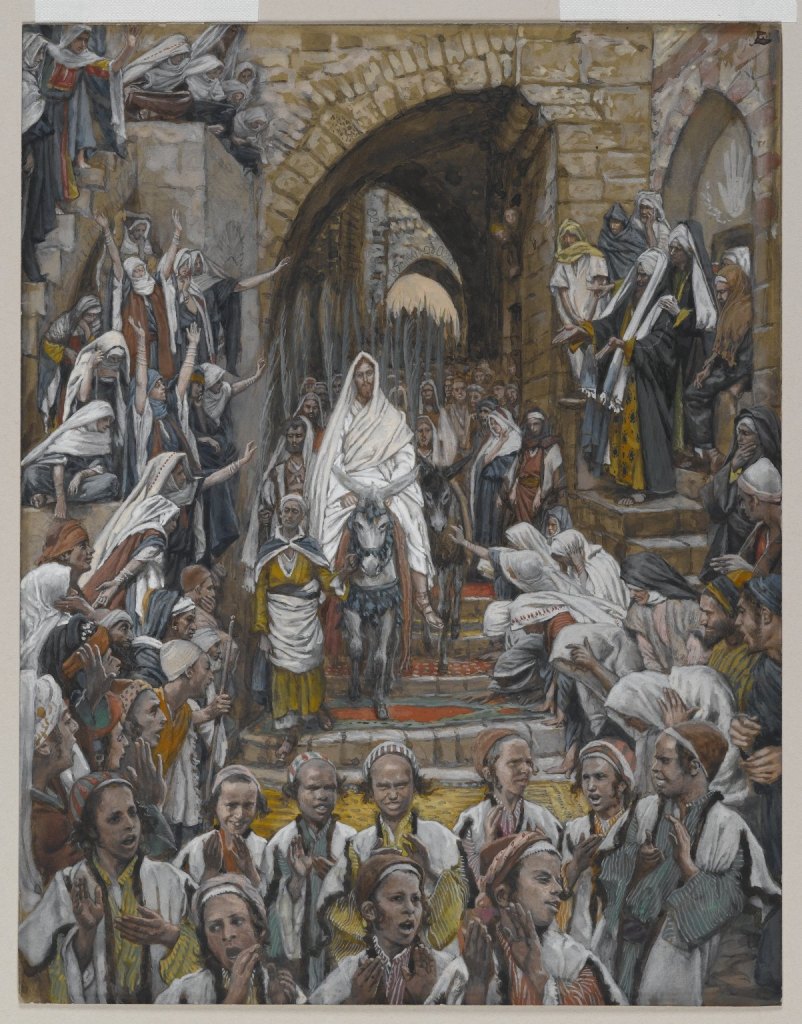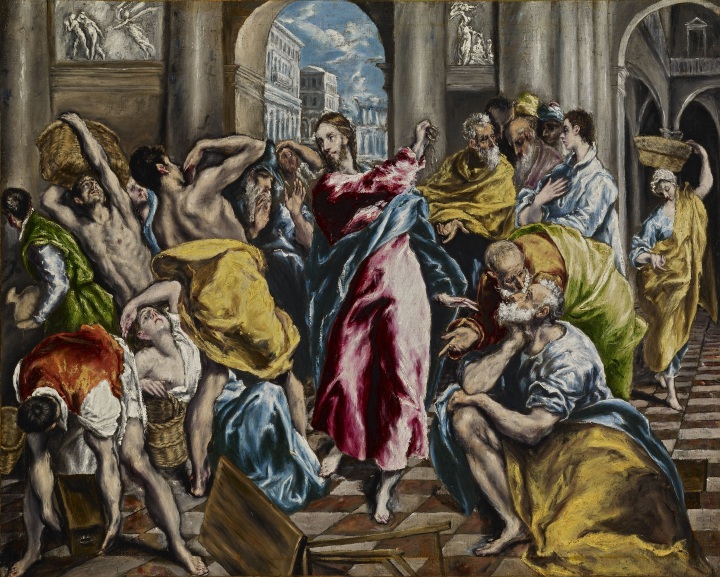If anyone asks you why you are untying it [the ass the disciples were sent to find], this must be your answer, ‘The Lord has need of it’ (Lk 19:31). Perhaps no greater paradox was ever written than this: on the one hand the sovereignty of the Lord, and on the other hand his ‘need’. His combination of Divinity and dependence, of possession and poverty was a consequence of the Word becoming flesh. Truly, he who was rich became poor for our sakes, that we might become rich. Our Lord borrowed a boat from a fisherman from which to preach; he borrowed barley loaves and fishes from a boy to feed a multitude; he borrowed a grave from which he would rise; and now he borrows an ass on which to enter Jerusalem. Sometimes God pre-empts and requisitions the things of man, as if to remind him that everything is a gift from him.
Fulton Sheen, The Life of Jesus
The scene depicted in today’s Gospel seems like a triumph. Jerusalem is celebrating: those gathered treat Jesus’ entry into Jerusalem as the triumphal entry of the Messiah. People lay down their clothes and wave palm branches. The crowd cry out for God to save them, and that is exactly what he will do in a few days time, upon the Cross. This is a God who keeps his promises and who also defies human expectations. The masses in Jerusalem are expecting a king of the Davidic line. One who would be seen as a challenge to the ruling élite, the status quo. But in, Christ, God gives Israel something else: a King of the line of David, yes, but one who rules with love, who has no desire for power, or honour. Leaders and those in authority are threatened by him: Jesus turns their world on its head. He is an awkward inconvenience. Jesus does not want their power. He has come to be and do something completely different. What is seen as a potential political coup is in fact a renewal of religion, the fulfilment of prophecy, and a new hope for Israel.
In riding into Jerusalem Jesus is fulfilling the prophecies of Zechariah:
Rejoice greatly, O daughter of Zion! Shout aloud, O daughter of Jerusalem! Behold, your king is coming to you; righteous and having salvation is he, humble and mounted on a donkey, on a colt, the foal of a donkey. (Zech 9:9)
The King of Israel comes riding on a donkey: a humble beast of burden, which carried his Mother to Bethlehem for his birth, and carried the Holy Family into exile in Egypt. It is an act of humble leadership which fulfils what was foreseen by the prophets. It shows us that Jesus Christ is truly the one who fulfils the hopes of Israel. The Hebrew Scriptures look forward to the deliverance of Israel, which is enacted in front of their very eyes. God is saving His people, but they cannot see it. In a few days time all will have changed, love will turn to hatred; joy to sadness.
This is why today, and throughout Holy Week, we will have readings from the prophet Isaiah, which are known as the Songs of the Suffering Servant. This morning we see the servant being mistreated. He is struck on the back, his beard is torn out, he is spat at and insulted. This will all come to pass as Our Lord goes to the Cross on Good Friday. It is the fulfilment of prophecy. God will show us how much he loves us by enduring such treatment.The events of Holy Week demonstrate what humanity is capable of: anger, hatred, bitterness, mob rule, and the desire to have a scapegoat, someone to blame. This is fallen, sinful humanity at its worst, and we will see more of it over the coming days. It should shock us, we should feel sick to the pits of our stomachs, because it shows us why Christ had to die — to overcome human sin, the world, and the Devil with the redemptive power of God’s Love.
And so it begins: Our Lord and Saviour makes a triumphal entry into Jerusalem. He is hailed as the Messiah, and it is a cause for celebration and joy. But, this is a week which will see Jesus betrayed by a close friend, arrested, abandoned, tried and killed as a common criminal. Strangely enough, the world around us can still be just as fickle, just as quick to turn someone from hero into persona non grata. Lest we think that somehow we are better, more advanced, more civilised people, the plain unvarnished truth is that we are not. We need the annual reminder which the Church gives through its liturgical year — a chance to be confronted by stark realities, and to be brought up short by them. What Christ says and does in this coming week, He says to us, He does all this for us — to Heal us, to Restore us. Jesus says and does these things so that we can live His risen life here and now, as the people of God, sharing in His Death and Resurrection though our baptism, trusting in Him.
In our pilgrimage through Lent, through our prayer, and our fasting, we hope to increase our closeness to Christ. By following Him, and meditating upon His Passion, we are transformed by His love, we follow in His footsteps, and enter into the mystery of God’s love poured out on the world. In the next few days we will go to the Upper Room, we will watch and wait with Christ, we will walk the way of the Cross, and we will gaze upon Christ crucified. Doing so, we will see just how much God loves us — the lengths to which God will go to demonstrate that love, and make it a reality in our lives. This is how we prepare to celebrate Easter: Our Lord’s rising from the tomb, His conquering death, so that we may have new life in Him.
In his Letter to the Christians in Philippi, written in prison in Rome in ad62, St Paul lays great stress upon the Humility of Jesus Christ. Humility is not a popular virtue these days, in fact the world around us would have us be quite the opposite: full of ourselves, with a high opinion of ourselves. Ours is a world which is more and more characterised by the sin of selfishness. The individual is all that matters: me and what I want, that is all that counts. At the root of it all is pride, thinking that we are more important than we are, making ourselves the centre of things, whereas we need to put God at the centre of things, and learn to be thankful.
Gratitude is characteristic only of the humble. The egotistic are so impressed by their own importance that they take everything given them as if it were their due. They have no room in their hearts for recollection of the undeserved favours they have received.
Fulton Sheen, On Being Human, 1982: 325
We need to have the mind of Christ, a mind devoted to love and service of God. Christ doesn’t just do what He wants to, but everything He says and does is the will of God the Father. Jesus prays in the Garden of Gethsemane for the strength to do God’s will. He demonstrates humility and obedience in action: embracing the most shameful death possible, for love of us. Thus we should love Jesus, we should worship Him, because He is God, and He loves us. The Saviour of the World scorns majesty. He embraces shame and sin, total utter degradation to save us. Jesus does this to heal the wounds of sin and division, so that we might have life, and life in all its fulness, with Him, for ever. This is why Jesus is willing to suffer, to be vulnerable, to take our human frailty and to redeem it through His suffering. Through His vulnerability, He shows the World that God’s ways are different from ours. This is the example for us to follow — the way of suffering love and humility
Today, and in the coming week, we will see what God’s Love and Glory are really like. It is not what people expect. It is power shown in humility, strength in weakness. As we continue our Lenten journey in the triumph of this day and looking towards the Holy and Life-giving Cross and beyond to the new life of Easter, let us trust in the Lord. Let us be like him, and may He transform our hearts, our minds and our lives, so that they may have live and life in all its fullness. We are fed by the word of God and by the Sacrament of His Body and Blood to be strengthened, to share in His divine life, to fit us for Heaven. Forgiven and forgiving, may all that we say, or think, or do, may all that we are be for the praise of God the Father, God the Son, and God the Holy Spirit, to whom be ascribed, as is most right and just, all might, majesty, glory dominion and power, now and forever. Amen.



